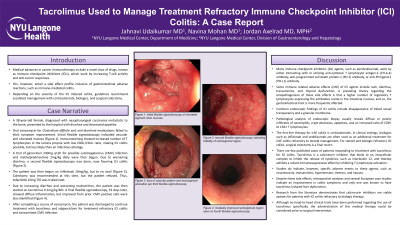Sunday Poster Session
Category: Colon
P0221 - Tacrolimus Used to Manage Treatment Refractory Immune Checkpoint Inhibitor Colitis: A Case Report
Sunday, October 22, 2023
3:30 PM - 7:00 PM PT
Location: Exhibit Hall

Has Audio

Jahnavi Udaikumar, MD
NYU Grossman School of Medicine
Brooklyn, NY
Presenting Author(s)
Jahnavi Udaikumar, MD1, Navina Mohan, MD2, Jordan Axelrad, MD, MPH3
1NYU Grossman School of Medicine, Brooklyn, NY; 2NYU Langone Hospital-Brooklyn, Brooklyn, NY; 3NYU Grossman School of Medicine, New York, NY
Introduction: Cancer immunotherapy includes the use of immune checkpoint inhibitors (ICIs). ICIs, however, can cause gastrointestinal adverse reactions, such as colitis. Here, we explore a case of corticosteroid and biologic refractory ICI colitis, which appeared destined for surgical intervention, but was successfully salvaged with tacrolimus.
Case Description/Methods: A 38-year-old female, diagnosed with nasopharyngeal carcinoma metastatic to the bone, presented to the hospital with diarrhea and decreased appetite. Oral vancomycin for Clostridium difficile and anti-diarrheal medications failed to elicit symptom improvement. Initial flexible sigmoidoscopy showed vascular and ulcerated mucosa (Figure 1). Immunostaining indicated increased number of T lymphocytes in the lamina propria with low CD8+/CD4+ ratio, making ICI colitis possible, but less likely than an infectious etiology. A trial of ganciclovir 240mg q12h for possible cytomegalovirus (CMV) infection and methylprednisolone 2mg/kg daily were begun. Due to worsening diarrhea, a second flexible sigmoidoscopy was done, now favoring ICI colitis (Figure 2). The patient was then given infliximab 10mg/kg, but to no avail (Figure 3). Colectomy was recommended at this time, but the patient refused. Thus, tofacitinib 10mg TID was begun. Due to increasing diarrhea frequency and malnutrition, the patient was then trialed on tacrolimus 0.1mg/kg BID. A final flexible sigmoidoscopy, 53 days later, showed diffuse inflammation, but improved from prior. CMV positive cells were also identified (Figure 4). After completing a course of vancomycin, the patient was discharged to continue treatment with tacrolimus and valganciclovir for treatment refractory ICI colitis and concomitant CMV infection.
Discussion: ICI agents are used to manage malignancies, but lead to side effects, such as colitis. Pathological findings of ICI colitis include disappearance of blood vessel transparency, neutrophilic infiltrates, crypt abscesses, apoptosis, and an increased CD8+/CD4+ T lymphocyte ratio. ICI colitis is first managed with corticosteroids and then biologics, such as those used to treat inflammatory bowel disease. Colectomy is a final resort. There are few published cases of patients responding to treatment with tacrolimus. One postulation is the overlapping similarity of both ICI colitis and ulcerative colitis. Although no clinical trials exist, the administration of tacrolimus medical therapy could be considered prior to surgical intervention for treatment refractory ICI colitis.

Disclosures:
Jahnavi Udaikumar, MD1, Navina Mohan, MD2, Jordan Axelrad, MD, MPH3. P0221 - Tacrolimus Used to Manage Treatment Refractory Immune Checkpoint Inhibitor Colitis: A Case Report, ACG 2023 Annual Scientific Meeting Abstracts. Vancouver, BC, Canada: American College of Gastroenterology.
1NYU Grossman School of Medicine, Brooklyn, NY; 2NYU Langone Hospital-Brooklyn, Brooklyn, NY; 3NYU Grossman School of Medicine, New York, NY
Introduction: Cancer immunotherapy includes the use of immune checkpoint inhibitors (ICIs). ICIs, however, can cause gastrointestinal adverse reactions, such as colitis. Here, we explore a case of corticosteroid and biologic refractory ICI colitis, which appeared destined for surgical intervention, but was successfully salvaged with tacrolimus.
Case Description/Methods: A 38-year-old female, diagnosed with nasopharyngeal carcinoma metastatic to the bone, presented to the hospital with diarrhea and decreased appetite. Oral vancomycin for Clostridium difficile and anti-diarrheal medications failed to elicit symptom improvement. Initial flexible sigmoidoscopy showed vascular and ulcerated mucosa (Figure 1). Immunostaining indicated increased number of T lymphocytes in the lamina propria with low CD8+/CD4+ ratio, making ICI colitis possible, but less likely than an infectious etiology. A trial of ganciclovir 240mg q12h for possible cytomegalovirus (CMV) infection and methylprednisolone 2mg/kg daily were begun. Due to worsening diarrhea, a second flexible sigmoidoscopy was done, now favoring ICI colitis (Figure 2). The patient was then given infliximab 10mg/kg, but to no avail (Figure 3). Colectomy was recommended at this time, but the patient refused. Thus, tofacitinib 10mg TID was begun. Due to increasing diarrhea frequency and malnutrition, the patient was then trialed on tacrolimus 0.1mg/kg BID. A final flexible sigmoidoscopy, 53 days later, showed diffuse inflammation, but improved from prior. CMV positive cells were also identified (Figure 4). After completing a course of vancomycin, the patient was discharged to continue treatment with tacrolimus and valganciclovir for treatment refractory ICI colitis and concomitant CMV infection.
Discussion: ICI agents are used to manage malignancies, but lead to side effects, such as colitis. Pathological findings of ICI colitis include disappearance of blood vessel transparency, neutrophilic infiltrates, crypt abscesses, apoptosis, and an increased CD8+/CD4+ T lymphocyte ratio. ICI colitis is first managed with corticosteroids and then biologics, such as those used to treat inflammatory bowel disease. Colectomy is a final resort. There are few published cases of patients responding to treatment with tacrolimus. One postulation is the overlapping similarity of both ICI colitis and ulcerative colitis. Although no clinical trials exist, the administration of tacrolimus medical therapy could be considered prior to surgical intervention for treatment refractory ICI colitis.

Figure: ICI colitis refractory to infliximab and tofacitinib and eventually only responded to tacrolimus
Disclosures:
Jahnavi Udaikumar indicated no relevant financial relationships.
Navina Mohan indicated no relevant financial relationships.
Jordan Axelrad: AbbVie – received consulting fees. Adiso – received consulting fees. BioFire Diagnostics – Consultant, Grant/Research Support. Bristol Myers Squibb – received consulting fees. Fresenius Kabi – received consulting fees. Janssen – received consulting fees. Pfizer – received consulting fees.
Jahnavi Udaikumar, MD1, Navina Mohan, MD2, Jordan Axelrad, MD, MPH3. P0221 - Tacrolimus Used to Manage Treatment Refractory Immune Checkpoint Inhibitor Colitis: A Case Report, ACG 2023 Annual Scientific Meeting Abstracts. Vancouver, BC, Canada: American College of Gastroenterology.

